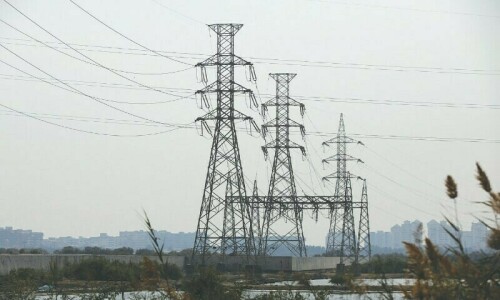ISLAMABAD: The Indian High Commission on Wednesday submitted an appeal to the Foreign Office against the death penalty awarded to Indian spy Kulbhushan Jadhav by a military tribunal.
“Appeal, in Kulbhushan Jadhav case, filed by High Commissioner Gautam Bambawale with Pakistan’s Foreign Secretary in Islamabad today,” the Indian High Commission tweeted after the envoy visited the FO.
There was no word from the FO on the meeting.
Read: To what lengths will India go to save Jadhav?
This was the Indian envoy’s second visit to the FO in connection with Jadhav’s death sentence. During his last visit, he had submitted a request for consular access to Jadhav.
The same request was made this time as well.
The Indian external affairs ministry (EAM) in a statement from New Delhi said Mr Bambawale had delivered to Foreign Secretary Tehmina Janjua a petition from Jadhav’s mother for the appellate court. The spy’s mother has also sought the Pakistani government’s intercession in the case for his release.
“The High Commissioner handed over a petition by the mother of Shri Kulbhushan Jadhav to the Federal Government of Pakistan. Also handed over was an appeal by the mother to the Court of Appeal,” the EAM statement said, adding that Jadhav’s mother “has requested the intervention of the Federal Government of Pakistan for his release and has expressed the desire to meet him”.
Army Chief Gen Qamar Bajwa had on April 10 confirmed the death sentence awarded to Jadhav by Field General Court Martial after trying him under the Pakistan Army Act for his involvement in espionage and sabotage activities in Pakistan.
Jadhav had got 40 days to appeal the sentence beginning the ratification of death penalty by the army chief.
His mother’s appeal for the appellate court may not be the right way to proceed because under the military’s legal system, the convict has to do it himself and is issued a document for filing appeal at the time of his sentencing.
“It is a violation of the Army Act,” military law expert retired Col Inam-ur-Raheem said, adding that in military the appeal process had to be initiated by the convict, possibly with the help of a counsel.
However, he noted that in the civilian judicial process, appeals could be filed by someone related to the convict. Petitions against decisions by military courts trying civilians accused of terrorism, he recalled, were filed by the parents of the convicts.
High Commissioner Bambawale, meanwhile, has also asked the Foreign Office for facilitation in visas for Jadhav’s parents so that they could travel to Pakistan for pursuing the appeals process.
“They have applied for necessary visas with the Pakistan High Commission in New Delhi,” the statement said. The same was also conveyed to Pakistan’s high commissioner in Delhi.
Published in Dawn, April 27th, 2017








































